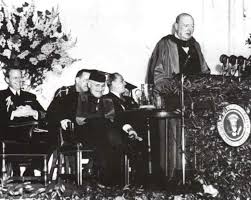This week marks the 67th anniversary of
Winston Churchill's 'Iron Curtain' address (actually named 'The Sinews of Peace'), which he called "the most important speech of my career". And he'd given one or two of those.
Churchill's speech in the unlikely venue of
Westminster College in Fulton, Missouri, was panned at the time for blasting Soviet Russia, whom many in Britain and the US still considered an ally, for warning of the potential of World War Three and for calling out the divisions between the Communist East and democratic West. Of course, Churchill's illustration of the "iron curtain" (a term he made popular but did not invent) was later embodied in the defining symbol of the Cold War - the Berlin Wall. And you can hardly watch a news broadcast on foreign affairs without hearing Churchill's term for the bond between the US and the British Commonwealth, the "special relationship" (though quite how "special" it is right now is debatable.)

But is the speech still worth
listening to and reading about, all these years later? After all, we'll be celebrating the 25th anniversary of the Berlin Wall next year and though Communism remains a force, it is hardly the global menace that Churchill spoke of. Despite these facts, I believe Churchill's "most important" speech should indeed be studied, and not merely as a historical relic. Here are a few reasons why:
1) Leadership
When he spoke in Fulton in March 1946, Churchill was no longer Prime Minister. The Conservative Party was punished for things that happened before Winston became head of a coalition government - not least the appeasement of Baldwin and Chamberlain and the poor standard of living many Britons had during their tenure. While the Tories campaigned on the strength of Churchill's war leadership, the Labour Party looked forward, creating a manifesto that addressed the postwar housing shortage, rebuilding wartime damage and, for good or for ill, extending socialized medicine.
But though he had lost his post of prime minister, Churchill's role of statesman was not over. He recognized that his stark warning about Communism would be unpopular, as did Harry Truman, who later disingenuously denied reading the speech before Churchill delivered it.
Yet Churchill recognized that to truly lead you must be willing to risk unpopularity, even ridicule, to tell hard truths. And what he said at Fulton - about the perils of expansionist Communism, about the need for the US, Britain and the rest of the English-speaking peoples to stand together in good times and in ill - was certainly truth. As predicted, Churchill was derided as an imperialist, an old Tory, and, by Stalin himself, as a warmonger. And yet, after braving hundreds of protesters yelling "GI Joe is home to stay, Winnie, Winnie, go away" to give another bold speech days later at New York's Waldorf Astoria hotel, Churchill stood his ground, stating that "I do not wish to withdraw or modify a single word."
Click here to read the rest of this article via the
Huffington Post.

